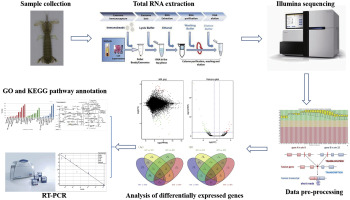当前位置:
X-MOL 学术
›
Comp. Biochem. Physiol. D Genom. Proteom.
›
论文详情
Our official English website, www.x-mol.net, welcomes your
feedback! (Note: you will need to create a separate account there.)
Transcriptome analyses reveal alterations in muscle metabolism, immune responses and reproductive behavior of Japanese mantis shrimp (Oratosquilla oratoria) at different cold temperature.
Comparative Biochemistry and Physiology D: Genomics & Proteomics ( IF 2.2 ) Pub Date : 2019-08-05 , DOI: 10.1016/j.cbd.2019.100615 Fangrui Lou 1 , Tianxiang Gao 2 , Zhiqiang Han 2
Comparative Biochemistry and Physiology D: Genomics & Proteomics ( IF 2.2 ) Pub Date : 2019-08-05 , DOI: 10.1016/j.cbd.2019.100615 Fangrui Lou 1 , Tianxiang Gao 2 , Zhiqiang Han 2
Affiliation

|
Low temperature reduction is thought to cause widespread effects on the physical and behavioral traits of marine organisms, which include metabolic processes, immune responses, and reproductive behavior. Crustaceans are generally considered sensitive to temperature reduction due to the lack of efficient regulators. To better understand the molecular regulatory mechanisms of crustacean exposure to cold stress, Japanese mantis shrimp (Oratosquilla oratoria) was chosen as a representative crustacean. Transcriptomic responses in O. oratoria from five temperatures (25 °C, 22 °C, 19 °C, 16 °C, and 13 °C) were studied using RNA-seq. A total of 64.91 Gb of clean transcriptomic data were generated in 10 libraries and then spliced into 52,107 unigenes with an average length of 1089 bp and an N50 length of 1872 bp. A total of 14,841 unigenes was annotated in at least one database using Blastx alignment. Compared with the control temperature (25 °C), 7, 21, 58, and 236 unigenes were significantly differentially expressed at 22 °C, 19 °C, 16 °C, and 13 °C, respectively. GO analysis showed that 6, 20, 27, and 35 terms were significantly enriched at 22 °C, 19 °C, 16 °C, and 13 °C, respectively. In addition, 2, 5, 2, and 10 significant pathways were presented at 22 °C, 19 °C, 16 °C, and 13 °C, respectively. Combining NR, GO, and KEGG annotation information, many genes significantly differentially expressed at low temperatures may be associated with metabolic processes, immune response, and reproductive behavior. Additionally, we reconstructed the phylogenetic relationship based on 366 orthologous genes and the predicted differentiation time of O. oratoria and P. vannamei range from 212.82 to 365.30 Mya. Furthermore, 16 orthologous genes were identified as PSGs and 30 orthologous genes were identified as FEGs and these adaptive genes were associated with energy metabolism, stress response and immunity, and multiple cellular processing. These results provide fundamental information about molecular mechanisms regulating cold stress response of O. oratoria.
中文翻译:

转录组分析揭示了在不同的低温下日本螳螂虾(Oratosquilla oratoria)的肌肉代谢,免疫反应和生殖行为发生变化。
人们认为低温降低会对海洋生物的生理和行为特征产生广泛影响,包括代谢过程,免疫反应和生殖行为。由于缺乏有效的调节剂,甲壳类动物通常被认为对温度降低敏感。为了更好地了解甲壳动物暴露于冷胁迫下的分子调控机制,日本螳螂虾(Oratosquilla oratoria)被选为代表性的甲壳动物。使用RNA-seq研究了五种温度(25°C,22°C,19°C,16°C和13°C)在O. oratoria中的转录组反应。在10个文库中生成了总共64.91 Gb的干净转录组数据,然后将其剪接到52,107个单基因中,平均长度为1089 bp,N50长度为1872 bp。共14个 使用Blastx比对,在至少一个数据库中注释了841个单基因。与对照温度(25°C)相比,分别在22°C,19°C,16°C和13°C时有7、21、58和236个单基因显着差异表达。GO分析显示,分别在22°C,19°C,16°C和13°C时分别显着富集了6、20、27和35个项。此外,分别在22°C,19°C,16°C和13°C下显示了2、5、2和10个重要途径。结合NR,GO和KEGG注释信息,许多在低温下显着差异表达的基因可能与代谢过程,免疫反应和生殖行为有关。另外,我们基于366个直系同源基因以及O. oratoria和P.的预测分化时间重建了系统发生关系。凡纳尼的范围从212.82到365.30 Mya。此外,鉴定出16个直系同源基因为PSG,鉴定出30种直系同源基因为FEG,这些适应性基因与能量代谢,应激反应和免疫以及多细胞加工有关。这些结果提供了有关调节O. oratoria冷应激反应的分子机制的基本信息。
更新日期:2019-08-05
中文翻译:

转录组分析揭示了在不同的低温下日本螳螂虾(Oratosquilla oratoria)的肌肉代谢,免疫反应和生殖行为发生变化。
人们认为低温降低会对海洋生物的生理和行为特征产生广泛影响,包括代谢过程,免疫反应和生殖行为。由于缺乏有效的调节剂,甲壳类动物通常被认为对温度降低敏感。为了更好地了解甲壳动物暴露于冷胁迫下的分子调控机制,日本螳螂虾(Oratosquilla oratoria)被选为代表性的甲壳动物。使用RNA-seq研究了五种温度(25°C,22°C,19°C,16°C和13°C)在O. oratoria中的转录组反应。在10个文库中生成了总共64.91 Gb的干净转录组数据,然后将其剪接到52,107个单基因中,平均长度为1089 bp,N50长度为1872 bp。共14个 使用Blastx比对,在至少一个数据库中注释了841个单基因。与对照温度(25°C)相比,分别在22°C,19°C,16°C和13°C时有7、21、58和236个单基因显着差异表达。GO分析显示,分别在22°C,19°C,16°C和13°C时分别显着富集了6、20、27和35个项。此外,分别在22°C,19°C,16°C和13°C下显示了2、5、2和10个重要途径。结合NR,GO和KEGG注释信息,许多在低温下显着差异表达的基因可能与代谢过程,免疫反应和生殖行为有关。另外,我们基于366个直系同源基因以及O. oratoria和P.的预测分化时间重建了系统发生关系。凡纳尼的范围从212.82到365.30 Mya。此外,鉴定出16个直系同源基因为PSG,鉴定出30种直系同源基因为FEG,这些适应性基因与能量代谢,应激反应和免疫以及多细胞加工有关。这些结果提供了有关调节O. oratoria冷应激反应的分子机制的基本信息。











































 京公网安备 11010802027423号
京公网安备 11010802027423号